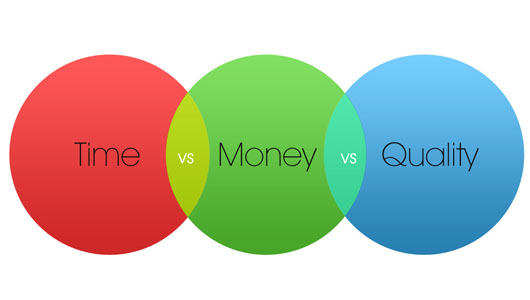Chris Potter
How to Win at Interviews

By John Reilly
You may be an experienced executive but it could be some time since you’ve applied for a new role and it’s always a good idea to do a little revision so I hope you won’t mind if I suggest a few ideas to how you might approach your next job interview. I’ve been helping candidates to secure roles up to board-level positions for over twenty-five years and there are a number of principles that have guided me which I think may help you land your dream job or at least take you one step nearer to it.
Think of it as a 'meeting'
The first helpful principle, I think, is to drop the word ‘interview’. What we’ve learned from political correctness is that words matter enormously; they can have a very significant emotional impact and colour our thinking and approach to people and situations. Whilst using the word ‘interview’ won’t offend anybody, I don’t think it’s helpful. The very sound of it is enough to make some people nervous and unhelpfully from the job-seeker’s perspective, it suggests a re-active process where questions are merely asked of you. I prefer the word ‘meeting’, which suggests a more pro-active approach, similar to seeing a client for the first time. After all, as the employer will be appraising you, you will be appraising them also, so the meeting should be a more inclusive process with you probing and asking questions of them as they do of you.
Tell of your achievements not just responsibilities
Like seeing a client in a business situation, a job meeting has a persuasive element. Essentially, it’s a ‘pitch’ situation. Although some people don’t like the term (words matter, again), applying for a job is a sales situation. You will be selling something, and that something is you. Here we come up against some limiting cultural conditioning we have in the UK. For many brought up in Britain, ‘blowing-our-own-trumpet’ is something traditionally frowned upon but if you’re trying to win a job in a competitive situation, it’s a hesitation you’ll have to overcome. You’re going to have to put your best case forward, not in a boastful way, but outlining to the employer your professional achievements not just your responsibilities. Never assume the employer can see how good you are or work out all you’ve achieved. They can’t. You have to tell them. Only then can they fairly appraise you. This is key. More of it later.
Prepare thoroughly
Your first task is to get thoroughly prepared. Look closely at the employer’s website and social media channels. Consider who their competitors might be and look at their websites also. Have a detailed read of the Job Description and prepare your thoughts of how your experience and achievements match the employer’s requirements. Now consider how you’d like to structure the meeting if no set structure has been outlined or is evident. The employer may have a set structure they work to; they may not. Have the meeting prepared in your head if not and be prepared to provide the energy of the meeting. Sitting back and waiting for it to come your way is not a tactic designed for success.
The three key elements of any successful hire and the questions employers are asking themselves are:
- Chemistry (do I like this applicant and would we work well together?)
- Ability (can the applicant actually do the job?)
- Motivation (do they want this job or just any new job?).
Meeting structure
So addressing Chemistry; Ability and Motivation, a suggested meeting structure would be (and it is only a suggestion):
· Introduction - build rapport well and try to generate some smiles, no-one hires anyone they don't like.
· Presentation - demonstrate ability by telling (and showing evidence of, if possible) your relevant achievements - blowing your own trumpet, if you like. This is essentially a sales process and you must be prepared to show off your achievements, ideally with numbers: managers love metrics. Demonstrate motivation by bothering to get really prepared with your own research about the hiring company, its market situation and probable competitors. If you don’t know much about the company, they won’t believe you want to work there.
· Close – “And do you have any questions for us?” Here are some suggested closing questions; you can choose the most appropriate and put them in your own words:
Closing questions
- Is there any reason you can see why you wouldn't be prepared to put me through to the next stage? This is should probably be the final one and is not a question for the fainthearted but it’s a very powerful one giving you the chance to respond to doubts and objections.
- How do you think I’d fit with the team?”
- How will my performance be evaluated?
- What do you expect me to achieve in my first three months?
- If you were taking this role, what would your priorities be?
- Who are the main stakeholders that I need to influence?
- Are you expecting some quick wins?
- If you were me, where would you focus your attention?
- What lurking surprises could detonate and push me off track?
- How is the job likely to change over the next couple of years?
This is a formula with a proven success rate and will help you if you follow the steps. You can adapt it to your own style and use only some of the elements if you prefer. It’s rare that applicants succeed in 100% of the job applications they make but if you follow these ideas, hopefully your average will increase. I hope you find the information useful and I wish you all the best!
How to succeed at a telephone screening

Time is tight and so initial telephone screening is on the rise with employers. Here are ten easy-to-follow tips to help you create the best impression and achieve your objective of progress in the recruitment process.
- Prepare
The most important tip. Make sure you’ve carefully read the employer’s website and the job brief (if one’s been supplied). Failure to do this is an almost certain progress killer. Consider who the employer’s competitors might be.
- Practice a CV run-through
The structure of these calls varies but they’re usually CV based. Practice running through a brief précis of your career so far, highlighting your career achievements not just your responsibilities. Be clear that this is a sales process and you’re the salesperson in this instance. The onus is on you to convince the person on the other end of the phone of your worth, and how you actually performed in your current/last role against your objectives will be a key consideration.
- Remember your objective
Few of us are ever offered a job after a brief chat on the phone; a face-to-face meeting almost always follows. So your objective in this call is to convince the employer that you’re worth an hour of his/her time in a meeting. You do this by firstly building rapport; then demonstrating your ability and motivation to do the job (more detail on this follows)
- Get the environment right
Avoid a busy, noisy environment. Be somewhere quiet where you are least likely to be disturbed and if you’re using a mobile, that reception is good and you’ve got enough battery. Ensure you allow enough time and don’t assume it will be a ‘quick ten minutes.’
- Start by building rapport
Nobody hires anyone they don’t like and first impressions count so don’t be cold; start by being pleasant and breaking the ice with the intention of getting the person to like you. Don’t go overboard on the jokes but getting a smile or laugh from the person is a definite bonus.
- Demonstrate your ability and quote some figures
This is the ‘meat’ of the call. After “Do I like this person?” the next question the person on the other end of the phone is asking themselves is “Can this applicant do the job?” You have to ‘blow your own trumpet’ and convince by succinctly highlighting your relevant career achievements so far. “I did this job well, therefore I’ll do your job well”, so to speak. Managers like metrics so any numbers you can quote help, such as: “I developed business by X %”; “I handled events with 500 delegates”; “I won X new clients”; “I saved the company X amount of money”; “I reduced waste by X %”; “I helped improve efficiency by X %”; “after the work I did my client’s business improved by X %” and so on.
- Demonstrate motivation by the quality of your preparation and asking questions
If they’re convinced you can do the job, the next question your interviewer is asking themselves is “Does this person actually want this job; are they really interested?” You demonstrate your motivation by getting fully prepared (see point No1). If you haven’t researched the company, they won’t believe you’re sufficiently interested. Helpful are insightful questions about the business and the role, and about the person you’re speaking to.
- Listen; but if you’re unsure, ask to rephrase or repeat back any question
Concentrate and be attentive; listening is the key part of communication but if you’re uncertain about a question, either ask the person to rephrase it or paraphrase the question back. Avoid doing this repeatedly but it’s better to make sure you’re answering the exact question being asked.
- Vary your pace, pitch and tone, and don’t forget to pause
It’s important to convey energy and empathy over the phone; a monotone delivery won’t aid your case. It helps if you can stand up or gently walk around as you speak, which conveys more energy (top radio broadcasters use this technique).Leave pauses after every few sentences to allow the person to either drill down or confirm they’ve heard enough.
- Close
You will probably be asked if you have any questions at the end. Have the confidence to ask for feedback, which will give you the chance to answer any objections. The daddy of all these questions is “Is there anything you’ve heard that would stop you asking me in for a meeting?” If the answer is “Yes”, ask what it is and answer the objection. If the answer is “No”, then ask if you can arrange the time and date of the meeting now. You may think this bold but confidence is impressive and helps instil confidence in others.
“Confidence is contagious. So is lack of confidence” Vince Lombardi.
© Reilly People Limited
How long should the interview process last?

By John Reilly
I remember once reading about the entrepreneur Sir Terry Matthews, who besides growing the telecoms giant Mitel, built a championship golf course in Wales. He said: “When you build a golf course there are three things you should worry about: drainage, drainage and drainage. And when you've done that, invest in a little more drainage.” I think he made his point. After more than a quarter of a century of recruiting, If I were to say what I thought the three things you should worry about in securing talent through the interview process was: it would be: speed, speed and speed. And when you’ve speeded up the process……well, you get my point.
Move promptly
When I say speed, I don’t mean haste. Probably a better word to describe the process would be prompt. Selecting the right candidates is one of the most important things you’ll do for your business and not to be rushed, but neither ought it to be drawn out over a long period. Slowness at arranging second and subsequent interviews is a huge de-motivator for candidates and you risk losing them to other offers. If you’re interested in hiring a top Talent, it’s highly likely your competitors are too and much like a couple in a dating scenario, a tardy response is often seen as a lack of interest and a prompt for one of the parties to look elsewhere.
Three interviews is optimum
The interview process should certainly be exacting and thorough but it should be over days rather than months as it often is. Google famously once interviewed a candidate sixteen times. “That was way too many, said former CEO Eric Schmidt, now a technical adviser, “We’ve since done a statistical analysis and the answer today is four to five interviews.” With highly sought after positions, like those at Google, stretching the process to five interviews won’t affect candidate supply greatly but for the majority of companies, which have much more competition for top Talent, three interviews is probably the optimum number. The most formal interviews I’ve arranged for a candidate with the same employer is six. The modal average is three. Informal meetings are sometimes added after the third interview but usually the decision to hire has been made by then.
Aim for less than three weeks
Staff-holidays notwithstanding, with the right preparation; planning and diary co-ordination, three interviews can be arranged to fit in a span of two weeks in most cases and this is an efficient time span to aim for. If it stretches to that period, you’ll still be ahead of a lot of your competitors.
According to Glassdoor’s latest survey the hiring process in the UK averages at nearly four weeks, slower than Canada, the US, Ireland and Australia. That four weeks is a mean average including Public Sector and Government hires, which often have complex vetting procedures. For private companies alone, it’s almost certainly less.
Longer doesn't mean better
Obviously, there is a balance to be had in the length of your interview process. Businesses face a trade-off between more carefully screening candidates and filling vacant roles as swiftly as possible. Too long a process, as I’ve alluded to, often results in talented applicants lost to competition but if slower processes result in better hires, are these not desirable? In my experience, longer interview processes are not as a result of layers of vetting and more careful screening but rather of organisational issues in the hiring company: co-ordinating diaries being a common cause. Hiring is often seen as incidental rather than core and not given the diary prominence it needs. Planning at the start of the interview process, with pre-allocated diary slots for interviewing managers can make a big difference. If the candidate doesn’t proceed through the process as hoped or expected, then that feed-up diary time can come as a bonus. Another idea is to interview candidates twice in one day. That often works for them and they need less days away from their current office and gives the hiring company the best chance to secure the candidate if he or she proceeds to offer. Better to give a candidate two, two-hour interviews on two different days than four, one-hour interviews over three or more weeks.
In summary then, private-sector companies without complex security vetting procedures would benefit from aiming to complete their interview processes in two-three weeks and more junior positions should be even less. The average time to hire a Marketing Assistant in the US for example is just eleven days; it’s probably not a lot different in the UK. Planning and diary co-ordination are the key factors. Plan the interview days and diary slots at the start of the process and move promptly through the stages. You’ll more often get the Talent you want and they will be impressed at your efficiency – a good first impression to give them.



